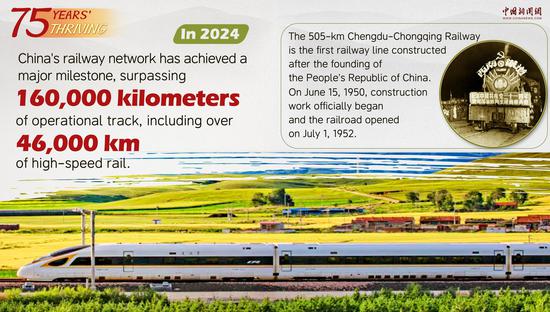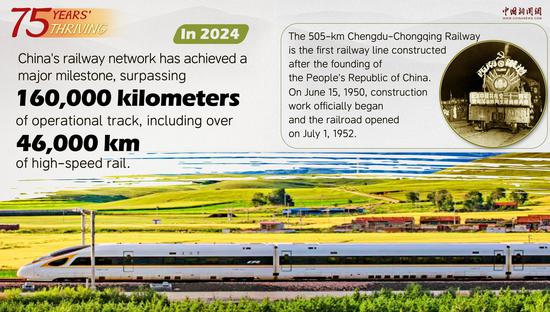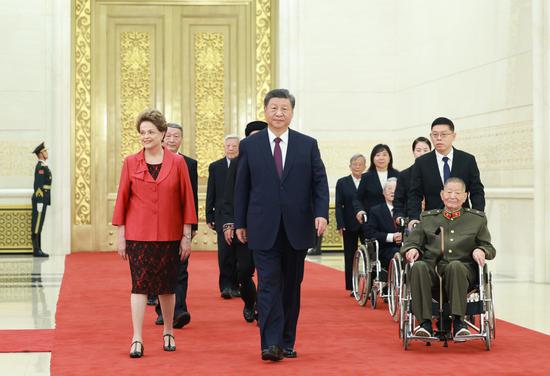
An employee works on a heavy machinery production line in Luoyang, Henan province, on Tuesday. (ZHANG YIXI/FOR CHINA DAILY)
With a potent set of new policies being implemented on various fronts, China is on course to achieve its full-year economic growth target of around 5 percent, signaling the resilience of the country's economy despite challenges at home and abroad, said a senior expert.
Chen Wenling, chief economist at the Beijing-based China Center for International Economic Exchanges, said that in the final stretch of the year, the top priority of the world's second-largest economy is to stabilize investment, boost consumption and keep market players afloat, in order to maintain a positive outlook among businesses and households, and support economic recovery.
"Scaling up effective investment should remain high on the government work agenda, as it is a crucial lever to shore up market confidence and support the economic recovery during this challenging period," Chen said in an exclusive interview with China Daily.
The National Development and Reform Commission said on Tuesday that the government will front-load 100 billion yuan ($14.2 billion) in spending from its budget for 2025 in addition to another 100 billion yuan for key construction projects.
The NDRC said it will issue investment plans and projects for the 200 billion yuan by the end of this month to achieve progress as soon as possible.
The government's policy tool kit, including measures such as increased investment, is not just short-term fixes, but a clear signal of its long-term commitment to the country's sustainable and healthy development, Chen said.
With the government's emphasis on investment made clear, Chen said it is equally crucial for policymakers to focus on reviving consumer demand to achieve a balanced and sustainable recovery.
According to the National Bureau of Statistics, final consumption expenditure contributed 82.5 percent to China's economic growth in 2023, cementing its position as the primary driver of the country's economic expansion.
"Consumption has become the linchpin of China's economic expansion, and it is only natural that fiscal policy now prioritizes measures to bolster consumer demand," Chen said, adding that China's fiscal policy is poised to take on a more proactive role in supporting the country's long-term economic wellbeing and reversing short-term unfavorable sentiment.
By implementing measures to reduce the financial pressures on middle and low-income households, such as through tax relief and targeted subsidies, policymakers can enable a more rapid and robust increase in consumer spending, Chen said.
This demographic is more responsive to changes in their disposable incomes, and thus the government's efforts to alleviate their financial burdens can quickly translate into a surge in consumption, she added.
Ensuring the stability and resilience of market players, especially in the private sector, is essential for unlocking the full potential of the economy and sustaining a robust recovery, as these enterprises serve as the fundamental driver of employment and income growth for residents and play a key part in investment, Chen said.
Strengthening the legal framework, improving law enforcement, and offering direct assistance to companies are all part of the government's comprehensive efforts to create a more conducive environment for the development of market entities, according to the NDRC.
In particular, the legislative process of law on promoting the private economy will be hastened, the commission said, adding that arbitrary charges and fines will not be tolerated.
In the first eight months of the year, the ratio of tax revenue to non-tax revenue, which includes income from fines and forfeitures, was roughly 6 to 4. The disproportionate dependence on fines and penalties as a means of generating government revenue has created a sense of uncertainty among market players, Chen said.
Establishing a business environment that is guided by market principles and underpinned by a robust legal framework is crucial for bolstering the confidence and trust of market entities, which are the lifeblood of the economy, Chen said.
"The government's multipronged approach has the potential to effectively stabilize expectations and set the stage for a sustainable economic recovery," Chen added.


















































 京公网安备 11010202009201号
京公网安备 11010202009201号